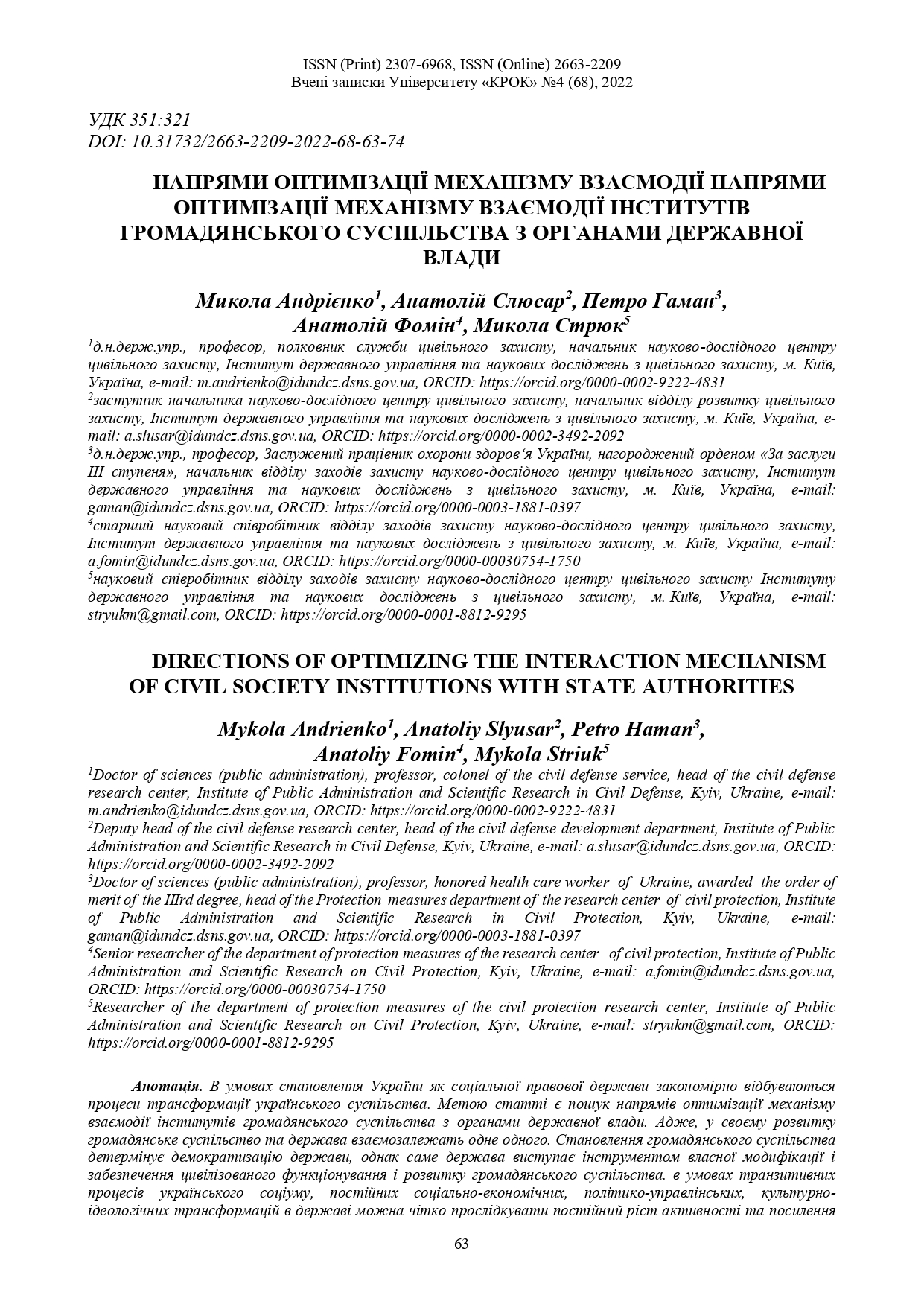DIRECTIONS OF OPTIMIZING THE INTERACTION MECHANISM OF CIVIL SOCIETY INSTITUTIONS WITH STATE AUTHORITIES
DOI:
https://doi.org/10.31732/2663-2209-2022-68-63-74Keywords:
civil society, optimization, state, mechanism of state administration, European integration, public authoritiesAbstract
In the conditions of the formation of Ukraine as a social legal state, processes of transformation of Ukrainian society naturally occur. The purpose of the article is to find ways to optimize the mechanism of interaction between civil society institutions and state authorities. After all, civil society and the state are interdependent in their development. The formation of civil society determines the democratization of the state, but it is the state that acts as an instrument of its own modification and ensuring the civilized functioning and development of civil society. in the conditions of transitive processes of Ukrainian society, constant socio-economic, political-administrative, cultural-ideological transformations in the state, it is possible to clearly trace the constant growth of activity and strengthening of the role of civil society institutions. At the same time, the rapid development of civil society, qualitative changes in the structure of which determine changes in the state administration system. Awareness of the interrelationship between civil society and the state is of great importance for deepening the understanding of modern trends in the development of state management mechanisms and justifying the need to modernize the system of state management in Ukraine. In this connection, there is an objective need to optimize the mechanism of interaction between state power and civil society through broad involvement of the latter's institutions in state management processes, which will make it possible for Ukraine to become a strong legal, social democratic state. After all, interaction between institutions of government and civil society is the key to the development of our state, strengthening of its economic potential and defense capability, in connection with which it is absolutely necessary to determine the factors that prevent this interaction and to determine ways to eliminate them. The article examines the category-conceptual apparatus regarding the interaction of the state and civil society. The most important directions of conflict reduction in power-society relations are analyzed. Directions for optimizing the interaction of state authorities with civil society institutions are proposed. The prospects for the development of civil society in Ukraine under the conditions of continuous influence of external and internal processes have been studied.
Downloads
References
Шаульська Г. М. Громадськість як індикатор системи державного управління та громадянського суспільства. Вісник Київського національного університету імені Тараса Шевченка. 2017. № 1 (8). С. 70-74.
Пухкал О. Г. Проблеми становлення громадянського суспiльства та реформування державного управлiння. Економiка та держава. 2010. № 7. С. 89–91.
Месюк М. П. Взаємодія інститутів влади та громадянського суспільства в україні у контексті євроінтеграційних процесів. Інвестиції: практика та досвід. 2018. № 8. C. 87-93.
Бойчук М. А. Влада і громадянське суспільство: механізми взаємодії. Київ : Атлант ЮЕмСі, 2007. С. 76-78.
Мельник Л. А. Взаємодія держави та інститутів громадянського суспільства: основні поняття, проблеми та стратегічні напрями. Державне управління: удосконалення та розвиток. 2019. №2. URL : http://www.dy.nayka.com.ua/pdf/2_2019/30.pdf.
Глубоченко К. О. Функцiонування механiзмiв взаємодiї органiв державної влади з громадськiстю у системi державного управлiння. Державне будiвництво. 2011. № 2. URL: http://nbuv.gov.ua/j-pdf/DeBu_2011_2_7.pdf.
Соцiальне партнерство i державна полiтика: вiд теорiї до практики демократизацiї державного управлiння / за заг. ред. В. М. Мартиненка. Xарків : ХарРI НАДУ «Магiстр», 2009. 252 с.
Зарічний О. А. Взаємодія держави та громадянського суспільства через інститути участі громадян в управлінні державними справами. Європейські перспективи. 2015. № 1. С. 48-51.
Ладиченко В. Проблеми взаємодії держави і громадянського суспільства. Публічне право. 2016. № 4 (24). С. 18-25.
Офіційний сайт Рада бізнес–омбудсмена. URL: https://boi.org.ua/.
Меморандум про взаєморозуміння щодо підтримки антикорупційної ініціативи України. URL : https://boi.org.ua/files/6j/fs/memorandum.pdf.
Vigoda E. From Responsiveness to Collaboration: Governance, Citizens, and the Next Generation of Public Administration. Public Administration Review. 2002. Vol. 62. № 5. Р. 527–540.
Гудима Н. Принципи вiдкритостi i прозоростi та їх реалiзацiя в державному управлiннi. Вiсник НАДУ. 2005. № 3. С. 77–85.
Кондратенко І. Громадянське суспільство та його вороги. Український тиждень. 2012. № 13 (230). С. 13-18.
Даудова Г. В. Взаємодiя держави i громадянського суспiльства: європейський досвiд. URL: http://www.kbuapa.kharkov.ua/e-book/db/2014-1/doc/4/01.pdf.
Лотюк О. С. Особливості механізму конституційно-правового регулювання громадянського суспільства. Вісник Вищої ради юстиції. 2013. № 1(13). С. 92-101.
Березенко В. В. Соцiальнi комунiкацiї в контекстi становлення громадянського суспiльства в Українi. Держава та регiони. Серiя: Державне управлiння. 2009. №1. С. 17–20.
Афонiн Е. А., Гонюкова Л. В., Войтович Р. В. Громадська участь у твореннi та здiйсненнi державної полiтики. Київ : Центр сприяння iнституцiйному розвитку державної служби, 2006. 160 с.
Горєлов Д. Державне фінансування громадських організацій: зарубіжний досвід та рекомендації щодо впровадження в Україні. Аналітична записка. URL : http://www.niss.gov.ua/articles/811/.
Щедрова Г. П. Громадянське суспільство та політична культура: теоретичний і прикладний аспекти. Луганськ : Елтон-2, 2009. 308 с.
Лотюк О. С. Особливості механізму конституційно-правового регулювання громадянського суспільства. Вісник Вищої ради юстиції. 2013. № 1 (13). С. 92-101.
Жовнiрчик Я. Ф. Напрямки оптимiзацiї взаємовiдносин органiв публiчної влади та iнститутiв громадянського суспiльства. Науковий вiсник Академiї мунiципального управлiння. Серiя : Управлiння. 2013. Вип. 4. С. 25–32. URL: http://nbuv.gov.ua/j-pdf/Nvamu_upravl_2013_4_5.pdf.
Iльїна М. В. Соцiально-економiчна роль некомерцiйних органiзацiй у забезпеченнi сталого розвитку суспiльства. Механiзм регулювання економiки. 2011. № 3. С. 27–36.

Downloads
Published
How to Cite
Issue
Section
License
Copyright (c) 2022 Микола Андрієнко, Анатолій Слюсар, Петро Гаман, Анатолій Фомін, Микола Стрюк

This work is licensed under a Creative Commons Attribution 4.0 International License.

